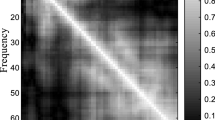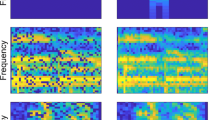Abstract
Proportional variance dependency among the frequency components is characteristic of natural signals and has been utilized in frequency-domain blind source separation to solve the permutation problem. In order to increase robustness in such methods, overall measures have been preferred to the measures between directly neighboring frequency components. The overall variance dependency pattern in the fullband, however, can vary by signals and is difficult to be modeled, whereas in smaller subbands the proportional variance dependency is more definite. Here, a novel permutation correction method that utilizes the proportional variance dependency in small subbands is proposed. A windowed likelihood function that uses source priors with internal variance dependency is employed as the measure of permutation correction. This method not only shows robust separation performance but also is computation-wise very efficient.
Preview
Unable to display preview. Download preview PDF.
Similar content being viewed by others
References
Herault, J., Jutten, C.: Space or time processing by neural network models. In: Proc. AIP Conf.: Neural Networks for Computing, vol. 151, pp. 206–211 (1986)
Comon, P.: Independent component analysis-a new concept? Signal Processing 36, 287–314 (1994)
Anemueller, J., Kollmeier, B.: Amplitude modulation decorrelation for convolutive blind source separation. In: Proc. Int. Conf. on Independent Component Analysis and Blind Source Separation, pp. 215–220 (2000)
Ikram, M.Z., Morgan, D.R.: A beamforming approach to permutation alignment for multichannel frequency-domain blind speech separation. In: Proc. IEEE Int. Conf. on Acoustics, Speech, and Signal Processing, pp. 881–884 (2002)
Sawada, H., Araki, S., Makino, S.: Measuring dependence of bin-wise separated signals for permutation alignment in frequency-domain BSS. In: Proc. IEEE Int. Symp. on Circuits and Systems, pp. 3247–3250 (2007)
Kim, T., Attias, H.T., Lee, S.Y., Lee, T.W.: Blind source separation exploiting higher-order frequency dependencies. IEEE Trans. on Speech and Audio Processing 15(1), 70–79 (2007)
Lee, I., Kim, T., Lee, T.W.: Complex FastIVA: a robust maximum likelihood approach of MICA for convolutive BSS. LNCS, pp. 625–632 (2006)
Lee, I., Kim, T., Lee, T.W.: 6. In: Independent Vector Analysis for Blind Speech Separation, pp. 167–190. Springer, Heidelberg (2007)
Lee, I., Hao, J., Lee, T.W.: Adaptive independent vector analysis for the separation of convoluted mixtures using EM algorithm. In: Proc. IEEE Int. Conf. on Acoustics, Speech, and Signal Processing, pp. 145–148 (2008)
Bingham, E., Hyvärinen, A.: A fast fixed-point algorithm for independent componenet analysis of complex-valued signals. Int. J. of Neural Systems 10(1), 1–8 (2000)
Matsuoka, K., Nakashima, S.: Minimal distortion principle for blind source separation. In: Proc. Int. Conf. on Independent Component Analysis and Blind Source Separation, pp. 722–727 (2001)
Allen, J.B., Berkley, D.A.: Image method for efficiently simulating small room acoustics. J. Acoust. Soc. Amer. 65, 943–950 (1979)
Author information
Authors and Affiliations
Editor information
Editors and Affiliations
Rights and permissions
Copyright information
© 2009 Springer-Verlag Berlin Heidelberg
About this paper
Cite this paper
Lee, I. (2009). Permutation Correction in Blind Source Separation Using Sliding Subband Likelihood Function. In: Adali, T., Jutten, C., Romano, J.M.T., Barros, A.K. (eds) Independent Component Analysis and Signal Separation. ICA 2009. Lecture Notes in Computer Science, vol 5441. Springer, Berlin, Heidelberg. https://doi.org/10.1007/978-3-642-00599-2_96
Download citation
DOI: https://doi.org/10.1007/978-3-642-00599-2_96
Publisher Name: Springer, Berlin, Heidelberg
Print ISBN: 978-3-642-00598-5
Online ISBN: 978-3-642-00599-2
eBook Packages: Computer ScienceComputer Science (R0)




